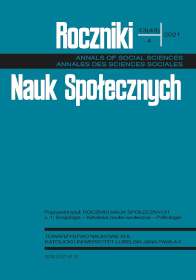The Transformation of Social Bonds During a Period of Intensified Online Studying and Work Caused by the SARS-CoV2 Pandemic—the Case of Poland
Abstract
Classic sociology evaluates and explores changes in social bonds. The last discussion on significant changes in social bonds at Polish universities took place when they experienced a deep transformation after the collapse of communism in Eastern and Central Europe in 1989. Thirty years later, the period of lockdown triggered by the SARS-CoV-2 pandemic has provided an interesting opportunity to examine how social order is created and social bonds developed without direct, face-to-face interactions. The authors use the schema of social bond formation by Jan Szczepański to analyze the nature of the stages and elements of social bonds built during a time of enforced indirect methods of teaching, studying, working and communicating in general. The article presents the results of research (survey CAWI) conducted on a sample of 555 students of three Polish universities representing various fields of study (divided in the article into two categories: technical and non-technical). The results exhibit the significance of gender and the field of study in adjusting to the new circumstances of online learning including the impeded process of creating social bonds (especially at the very beginning of studies when direct contacts are needed). The authors discuss the consequences of weakening social bonds within academia whilst also referring to the phenomena of social capital, the strength of weak ties and dormant ties.
Copyright (c) 2021 Roczniki Nauk Społecznych

This work is licensed under a Creative Commons Attribution-NonCommercial-NoDerivatives 4.0 International License.


